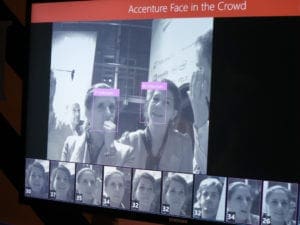ACLU: Police Use of Face-Recognition Tech is ‘Violating Americans’ Civil Rights’
This article was featured in our weekly newsletter, the Liberator Online. To receive it in your inbox, sign up here.
The American Civil Liberties Union, along the Leadership Conference on Civil and Human Rights, sent a letter to the Justice Department expressing concerns over federal, state, and local police use of facial recognition technology.
 The letter claims that a recent study carried out by the Center on Privacy & Technology at Georgetown Law shows that “law enforcement use of face recognition technology is having a disparate impact on communities of color, potentially exacerbating and entrenching existing policing disparities.”
The letter claims that a recent study carried out by the Center on Privacy & Technology at Georgetown Law shows that “law enforcement use of face recognition technology is having a disparate impact on communities of color, potentially exacerbating and entrenching existing policing disparities.”
Adding that said systems are powerful, the letter explained that a Federal Bureau of Investigation study from 2012 shows that the technology is “5 to 10 percent less accurate on African Americans than Caucasians.” By reaching out to the Justice Department, the ACLU plus over 50 other groups are asking the government to investigate police practices associated with the technology because of the system’s inaccuracies.
While the ACLU has not argued for an end to the use of the technology, the organization’s legislative counsel, Singh Guliani, said that, unless “meaningful safeguards are in place,” the use of the technology could be putting the privacy of Americans at risk.
Mentioning the fact that half of all U.S. adults are in government face recognition databases, Guliani added that allowing law enforcement to use these technologies without clear policies may lead to abuse.
According to the Georgetown report mentioned by the ACLU, abuse may come in different shapes and sizes.
Because many law enforcement agencies employ the technology in a continuous fashion, scanning individuals on real-time, researchers believe that this type of approach may violate people’s privacy simply because law enforcement is collecting footage of law-abiding citizens without seeking a warrant beforehand. In the report, the Center on Privacy & Technology team explains that this type of use is “generalized and invisible.” In many instances, the research team adds, abuse may lead to stifling of free speech.
Out of the 52 agencies using the system, the research team found at least one department using the face recognition tool to track individuals engaged in political, religious, or other type of “protected free speech.” But because of the lack of oversight, many departments do not have access to data on the use of the technology, making it difficult for researchers to identify other instances of abuse.
All of these problems are “unprecedented and highly problematic,” researchers added in the report.
In the group’s letter, the ACLU argued that the problems raised by the Georgetown study are “particularly disturbing” when we consider that federal, state, and local law enforcement agencies have been using these technologies for routine investigations without any oversight.
Considering law enforcement has been under heavy scrutiny recently over the use and abuse of “voodoo science,” it’s easy to see how the ACLU has reason to mistrust law enforcement with the use of such a powerful tool.

























